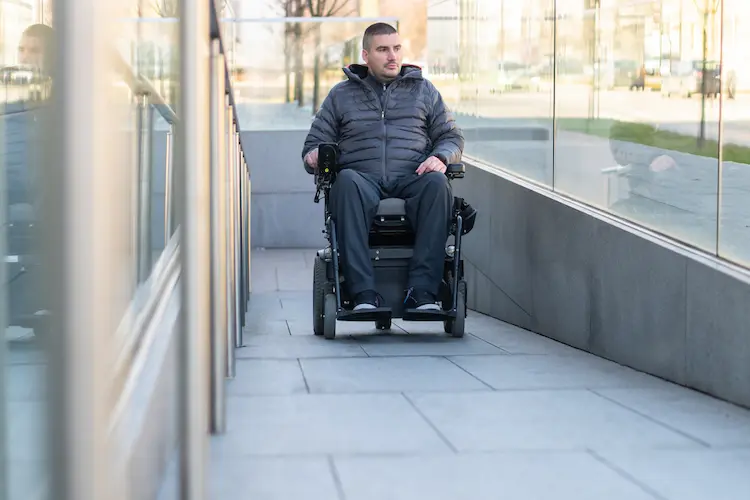John, who uses a wheelchair, faces daily struggles commuting to work. He often encounters buses needing more ramps and inaccessible bus stations, leading to long waits and difficulty boarding.
His difficulties worsen because he lacks readily available knowledge, and his experiences emphasize the need to understand and enforce disability rights.
It is a moral and legal obligation to fight for disability rights in a society prioritizing inclusion and equality. We’ll examine what these rights represent and how the government protects them.
Understanding Disability Rights
People with disabilities have certain legal and human rights that are referred to as disability rights. These rights are not exemptions but fundamental protections to guarantee that individuals with disabilities have equal rights and freedoms. They include a wide range of areas, both in the public and private spheres.
The Americans with Disabilities Act (ADA)
The Americans with Disabilities Act (ADA), passed in 1990, changed the game for disability rights. What makes the Americans with Disabilities Act (ADA) so important is the breadth of its coverage; it guarantees equal rights and opportunities for persons with disabilities across many domains.
All sectors of public life, including employment, education, transportation, and any other public or private establishments accessible to the public, are prohibited from discrimination against people with disabilities under this all-encompassing civil rights statute.
Key Rights Under the ADA
Here are, to name only a few of the fundamental rights granted by the ADA,
Employment Rights
One of the most critical aspects of the ADA is its focus on employment, and it established the Equal Employment Opportunity Commission (EEOC) to protect the rights of disabled people in the workplace.
The policy ensures equal employment opportunities by modifying work environments and accommodations, limiting pre-employment disability inquiries, and mandating reasonable accommodations for disabled employees without undue hardship.
Public Services and Non-Discrimination
People with disabilities are assured equal access to public services under the ADA.
Public transportation, schools, and other government-run services are all considered to be within the scope of this extensive mandate, ensuring that discrimination is not a barrier to living a full and productive life. Because of these laws, things have started to change, and now, people with disabilities can live their lives to the fullest.
Rights in Various Spheres of Life
The ADA provides rights for individuals with disabilities across various aspects of life, ensuring inclusivity and equal access in multiple spheres.
Housing Rights under the Fair Housing Act
Housing is a fundamental need, and the Fair Housing Act ensures that individuals with disabilities are not discriminated against in their pursuit of it. This act prohibits discrimination in the sale, rental, and financing based on disability, ensuring everyone has equal access to housing opportunities.
Wheelchair accessibility in all places, including entrances, restrooms, kitchens, and shared spaces, is a requirement of the Act for all new, larger residential structures.
For example, a landlord may reconsider a no-pets policy to accommodate a tenant’s service dog. At their own cost, tenants with disabilities can alter their living and common spaces to improve accessibility.
A small video explains the Fair Housing Act.
Learn how to get free home modifications to enhance the quality of life for those with mobility challenges.
Equal Educational Opportunities
Students with impairments are guaranteed equal access to educational opportunities under the Americans with Disabilities Act (ADA). It includes the following adjustments,
- Accessible Facilities: It entertains all physically accessible facilities, including ramps and elevators.
- Individualized Accommodations: Modified assignments, more time on tests, or assistive technology are all examples of accommodations that may be provided to students with special needs.
- Support Services: Resources such as sign language interpreters, note-takers, and specialized instructional materials are available as support services.
The Americans with Disabilities Act (ADA) and the Education for All Handicapped Children Act, now known as the Individuals with Disabilities Education Act (IDEA), jointly establish a comprehensive structure to ensure that students with disabilities have equitable access to education.
Dr. Eric Storch explains the federal regulations about the educational environment, with a specific emphasis on the Individuals with Disabilities Education Act (IDEA Act).
Inclusive Healthcare Services
Access to healthcare is a right, and for people with disabilities, this means receiving care that accommodates their specific needs. Detailed below is a review of what this implies in practice.
- Physical Accessibility: All patient rooms, corridors, and bathrooms in healthcare facilities must be easily accessible for those using wheelchairs.
- Communication Accessibility: For patients who are deaf or visually impaired, it is essential to provide resources in an accessible format or with sign language interpreters.
- Policy modifications are adjusting policies to meet requirements, such as changing appointment processes or permitting service animals.
- Staff Training: Healthcare workers must be trained to meet the needs of patients with disabilities and to comply with ADA regulations.
For medical transportation needs, explore free Uber rides for medical appointments.
Access to Public Accommodations
Public accommodations are essential for social participation, and the ADA ensures that individuals with disabilities have equal access to these facilities. It adds up all the modifications and accommodations in hotels, restaurants, theaters, and other public spaces, making them accessible to everyone, regardless of their physical or mental abilities.
Voting Rights
U.S. laws such as the National Voter Registration Act and the Voting Accessibility for the Elderly and Handicapped Act ensure that people with disabilities participate fully and efficiently in voting.
- Accessible Polling Places: The Americans with Disabilities Act mandates that all polling locations be physically accessible to individuals with disabilities, including booths, ramps, and clear signs.
- Alternative Voting Methods: In cases where a polling location is inaccessible, alternative voting methods such as curb voting, mail voting, or absentee balloting must be made available.
- Accessible Voting Equipment: The ADA also mandates that disabled individuals can vote privately and independently using assistive voting technology like tactile devices and audio ballots.
Rights in Communication and Technology
Rights related to telephone and television access are vital for individuals with hearing and speech disabilities.
People with trouble hearing or speaking can use assistive technologies such as closed captioning on television, accessible 911 services, captioned telephones, video relay services, text telephones, and Telecommunications Relay Services (TRS) for phone conversations.
Accessibility isn’t the only reason these services should be available; they should also guarantee inclusion and engagement in daily life.
Legal Protection and Enforcement
To guarantee their rights, people with disabilities must have legal protection, and laws must be enforced. State and local governments share a crucial responsibility for enforcing these rights.
They play a pivotal role in ensuring that the provisions of laws like the Americans with Disabilities Act (ADA) are not just words on paper but are actively implemented and upheld. It requires conducting complaint investigations, monitoring compliance, and taking corrective action when violations are found.
Civil Rights Violations and Federal Courts
In civil rights violations, federal courts frequently serve as the repository for justice. These courts play a crucial role in interpreting and implementing laws protecting people with disabilities, giving individuals a chance to seek justice when their rights have been violated.
Through their rulings, a federal court helps to shape the landscape of disability rights and ensure that the laws are applied fairly and consistently.
The Collaborative Effort in Rights Protection
Protecting the rights of individuals with disabilities is a collaborative effort involving various federal laws and agencies and local government services. Each entity has a unique role, from providing guidance and resources to enforcing compliance and addressing grievances.
Accessibility and Accommodations
Accessibility, both physical and digital, is the cornerstone of inclusivity for individuals with disabilities.
Physical accessibility in buildings, transportation, and public spaces is not just a convenience but a necessity that enables individuals with disabilities to participate fully in society. Similarly, digital accessibility ensures that websites and online services are usable by people with various disabilities.
Global Perspective on Disability Rights
Disability rights are not confined to any single country; they are a global concern. Internationally, there are various human rights treaties and conventions.
They include the United Nations Convention on the Rights of Persons with Disabilities (UNCRPD), emphasizing disability rights as an integral part of human rights. Numerous countries have passed or updated disability laws in response to the UNCRPD. Canada and Australia, for example, have strong disability rights laws, whereas the European Union’s European Accessibility Act prioritizes the accessibility of goods and services. WHO and NGOs are key in advocating for disability rights, promoting policy change, providing support and resources, and conducting research for their inclusion.
The involvement of these organizations highlights the universal commitment to ensuring equality and accessibility for all, regardless of disabilities.
Real-Life Examples
The rights of disabled people can be better understood by looking at actual events in real life, which show how these rights affect individuals and communities.
Jane, a graphic designer with a visual impairment, shared on a forum that she was provided with a specialized screen reader and software to magnify her computer screen at work. With the aid of the required modifications, she could do her job well.
Sarah, who is blind and mentally disabled, shares her story of how she got her reasonable accommodation. She used the Fair Housing Act to complain following the denial of an apartment he applied for based on her handicap. The landlord received guidance on fair housing regulations, and John got the required accommodation due to the following inquiry.
Jennie and Lora share that San Francisco’s public transportation system accommodates individuals with mobility challenges by providing buses equipped with wheelchair lifts and specific seating areas.
A small documentary by Netflix shows how the ADA altered today’s world as an equal and inclusive place for disabled people.
These real-world applications show how these rights have an effect by allowing people with impairments to engage in society fully.
Filing a Disability-related Complaint
If you have been subjected to handicap discrimination, you can register a complaint with the government. Various authorities are responsible for handling different kinds of complaints. For example, the EEOC should receive complaints about discrimination in the workplace, while the DOJ should handle matters about accessibility in public spaces.
Use this table to determine the appropriate agency and the procedure for filing your complaint. If you need advice or want to ensure your complaint is presented successfully, it could be helpful to talk to a lawyer focusing on disability rights.
Conclusion
Recognizing and supporting the rights of those with disabilities is a morally and legally necessary responsibility. It’s about making a world where people can live their best lives with respect and dignity, regardless of their talents. Adopting these rights helps create a more just and inclusive society that recognizes and appreciates everyone’s abilities.



